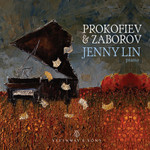|
Back
05/20/2017
“Prokofiev & Zaborov”
Sergei Prokofiev: Six Pieces from Cinderella, opus 102 – Four Pieces for Piano, opus 4
Kirill Zaborov: Neuf variations sur une mélodie originale de Dmitri Chostakovitch – Variations for Piano “Quattrocento” – Dix Apparitions – Suite “Entrelacs”
Jenny Lin (Piano)
Recording: Sono Luminus Studios, Boyce, Virginia (November 10-12, 2015) – 62’56
Steinway & Sons 30055 – Liner notes in English and French (Distributed by Bucklesweet Media)

   
If, like me, you have never heard Jenny Lin live, you could become an instant fan based on her latest Steinway & Sons recording, “Prokofiev & Zaborov.” Aside from her stellar technical artistry, she seems to have a unique understanding of the character of the music she is playing. Lin’s intriguing selections of rare piano pieces vary from a very young Prokofiev and his piano transcriptions of scenes from the Cinderella ballet score paired with new works from classical/jazz/improv composer Kirill Zaborov. Zaborov has collaborated with Lin in the past and cites her recording of Igor Stravinsky’s piano works as “opening me up to aspects of the composer of which I was unaware and profoundly transforming my view of his music.”
Lin’s interpretive artistry evokes the story, from the entre “Waltz” (Cinderella and Prince) of Cinderella to narrative scenes, “The Quarrel”, “Pas de châle” and “Amoroso.” Few ballets scores can be realized on solo piano with the dimensions that one experiences in a soundtrack propelling dancers in a full production story ballet with orchestra detailing. Yet, it is fascinating, and, in this case, thrilling to hear what Lin brings to it as a soloist.
The ballet was started in 1940, but Prokofiev did not premiere it until 1945. Instead, Prokofiev was finishing his more politically timely opera version of Tolstoy’s War and Peace. The Stalin regime was breathing down his neck to make it more nationalistic and Soviet, void of anything deemed as individual free expression.
In his book The Rest is Noise, Alex Ross writes, “Prokofiev, no less than Shostakovich, wished to map his country's destiny in sound.” Prokofiev would write that he viewed Cinderella as a humanist story. Cinderella after all was living in bondage at the mercies of her cruel stepmother and sisters. This provided him with a serviceable cover, to orchestrally tell a fairy story with subversive subtext which conveys a universal story of one’s liberation from oppression. Cinderella has both tragic and comic moments built in with ironic gaiety as the clock ticks down to midnight, and Lin conjures the glittering musical scene and its darkest shadows. br />
The other Russian composer artistically and personally surviving somehow under the Stalin regime was Shostakovich, and Kirill Zaborov pays homage with his Nine Variations on the theme by Dmitri Shostakovich. Zaborov writes laces in many Russian musical traditions in his music, and he contemplates what he observes as “mysterious essence” of Russian music. In the Variations he takes inspiration from a theme Shostakovich composed in 1932 for the song, “Pesnia o vstrechnom”, a hymn that “reverberates in the hearts of Russians” which was written by Boris Kornilov, Zaborov’s maternal grandfather.
In contrast, Zaborov describes his Variations for Piano “Quattrocento” as “fluid arabesques, whether ephemeral adagios or passionate outbursts” which was inspired by a trip to Florence. Lin ignites these vivid piano studies, contrasting moods of lightness in an Allegro vivace to the shadowy Lento espressivo.
Dix Apparitions are Zaborov miniatures all under two minutes. Some strike as virtuosic studies of counterpoint while others have an improvisational quality with echoes of Russian romanticism appearing and vanishing. Those are followed by Zaborov’s brooding Suite “Entrelacs” with dark, introspective episodes, played in sonorous intensity by Lin.
The recording concludes with Lin’s performance of Prokofiev’s Four Pieces for Piano. Composed in 1908, it “can be described as a mirror reflecting the country’s growing tensions”, Zaborov so notes. There is a sense of artistic freedom beginning with the wistful “Reminiscence”, then the rhythmic “Elan” that sounds balletic, followed by “Despair” with its straightforward narrative of anguished chords over a stilted three note dirge. The last section is the clamorous (almost vampy) “Diabolic Suggestion” which Lin doesn’t hold back essaying its blatant fury.
Lewis J. Whittington
|